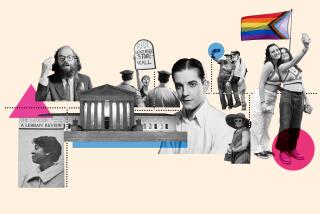You’re Gay, You Pay
- Share via
NEW YORK — In 1996, at a birthday dinner for a friend, talk turned to President Clinton’s reelection campaign -- a fraught topic, since seated opposite me were a quite conservative couple who worked in the financial industry. He was a pedigreed WASP; she was a Korean American accountant who had been adopted by a white Midwestern family. “You like Clinton?” the woman asked incredulously. “What about him do you like?” I explained that, for starters, the president supported my rights as a gay man.
That did it. The discussion quickly devolved into a vicious argument. I pointedly reminded the woman that Democrats, or liberals, or whomever they were bashing, had worked to overturn the anti-miscegenation laws that kept couples of different races from legally marrying. “Did you even know that before 1967 the two of you couldn’t marry in Virginia?” I asked them.
That seemed to penetrate the woman’s brain, but her fiance just let loose with what he’d clearly wanted to say all along: “I don’t want my tax dollars going to support your lifestyle.” He was talking about AIDS prevention and treatment programs like the Ryan White Act. I don’t recall my exact words, but my anger was enough to drive the couple from the restaurant.
It’s almost a decade later, and when I prepared my tax return recently I found myself wondering about how many of my tax dollars go to support things that can’t benefit me. For starters, there’s the money that pays the salaries of county clerks who issue marriage licenses, and the tax dollars that support the state’s considerable expenses in divorce proceedings. Until we attain the full rights of state-sponsored marriage, perhaps there should be a special tax bracket for gays, so that our tax dollars won’t have to subsidize activities in which we cannot participate.
West Hollywood Mayor Jeffrey Prang, who registered as a domestic partner with Raymundo Vizcarra last month, recently pointed out to me other benefits that gay couples are denied. In California, if an unmarried, property-owning couple split up, their property will be reassessed, which usually means a considerable bump up in taxes for the partner who retains the property. If one partner in a gay relationship dies, the surviving partner cannot collect the deceased’s pension or Social Security benefits. Married couples don’t have to suffer any of these hardships.
The website www.dontamend.com lists other gay penalties: “We do not get tax exemptions for our families,” it notes. “We have to pay transfer taxes when we add our domestic partners to our house deeds, [while] married couples are exempt.... The government refuses our children and our families the same legal protections and tax advantages provided children of straight couples.” It all amounts to a tax on being gay.
Some of this is being remedied piecemeal in scattered states and cities through domestic partnership and civil union laws. “But it still falls short,” says Prang. “It’s like Lego -- you’re piecing it together block by block. With marriage, you get the whole castle.” This year New Jersey Gov. James McGreevey signed a domestic partnership law that covers benefits like joint tax status, hospital visitation, healthcare proxies and insurance coverage. California is in the process of expanding its domestic partnership coverage, which currently guarantees less than 20 rights, to encompass hundreds of rights. a great advance. Still, marriage, Prang says, automatically confers 1,400 separate rights on its participants. And even the most sweeping partnership law, like Vermont’s, is valid only as long as a couple remain in the state, although states can pass laws to recognize the gay unions certified by other states.
Conservatives are so afraid of gay marriage that some of them have frantically embraced domestic partnership, which shows how close we are to getting, in Prang’s phrase, the whole castle. Time is on our side. As a recent Los Angeles Times poll revealed, Americans ages 18-29 “were more than four times as likely to support same-sex marriage as those over 65,” and even the majority of older Americans had to concede that gay marriage was “inevitable.”
The word “lifestyle” has often been used as a weapon to demean and demonize gays, as in, “I just can’t endorse that lifestyle.” The word conjured up images of anonymous sex and wild promiscuity. But increasingly, the laws of this country are coming to see key aspects of our “lifestyle” -- the desire for emotional partnership, family and stability, and the legal recognition of those desires -- as something benign and barely worth a yawn to the youngest U.S. voters. I have to hope that one day our lifestyle will elicit yawns instead of angst at tax time.
More to Read
Get the L.A. Times Politics newsletter
Deeply reported insights into legislation, politics and policy from Sacramento, Washington and beyond. In your inbox twice per week.
You may occasionally receive promotional content from the Los Angeles Times.










